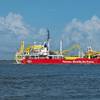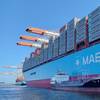Hurricane Michael Bears Down on Florida
Hurricane Michael is expected to strengthen today in the Gulf of Mexico, with the Florida panhandle directly in its dangerous path.
Thousands of local residents in Wakulla, Gulf and Bay counties have been ordered to leave. Forecasters now say that Michael could be a Category 3 storm when it makes landfall on Wednesday. That prediction, if true, would make the storm the strongest to hit this area in at least a decade.
As of 3 AM CDT on Tuesday, Michael was a Category 1 storm, with sustained winds of up to 90 miles per hour. It was gaining strength following a path that took it along Cuba's western tip, the National Hurricane Center (NHC) said. Compounding the prospect of a Category 3 storm’s impact, coastal storm surges of up to 12 feet are now expected along the panhandle, with as much as 12 inches of rain. In advance of the storm’s arrival, Florida Governor Rick Scott declared a state of emergency in 35 counties. National Guard soldiers were already helping to prepare in the area, with as many as 4,000 troops on standby.
After impacting Florida, hurricane models have Michael moving up the east coast on Wednesday and Thursday, and eventually plowing through the Carolinas, where much of the eastern part of the state and its seaports are still drying out following last month’s landfall of Hurricane Florence. Separately, oil producers halted nearly a fifth of Gulf of Mexico oil production and, by Monday, had begun evacuated some offshore personnel from platforms in the storm’s potential path. Almost 20 percent of U.S. crude oil production emanates from the Gulf of Mexico.
In its messy wake, Michael is also expected to produce heavy rainfall and flash flooding over portions of western Cuba during the next day or so.
Elsewhere, the U.S. Coast Guard set port condition ‘Whiskey’ for ports of Wilmington and Morehead City, NC ahead of the storm’s expected arrival. Both ports are currently open to all commercial traffic and all transfer operations may continue while Whiskey remains in effect. The Coast Guard also advised all ocean-going commercial vessels and ocean-going barges greater than 500 gross tons to make plans for departing North Carolina Ports. Vessels desiring to remain in port must immediately contact the COTP to receive permission and are required to submit a safe mooring plan in writing.












